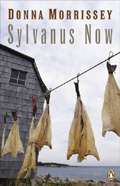
Donna Morrissey is a goddess. Just so you all know. She is a CanLit goddess.
I love her.
I thought I loved her when I read Kit's Law and I thought I loved her when I read Downhill Chance but, woe, I was so young and naiive in my love and it took my recent reading of Sylvanus Now for my love to come full circle and for me to fully realize the power of Morrissey's craft.
Oh Rachel-of-yesteryear--- you were so young, you merely appreciated her taut page turners---- her compulsively readable yarns of familial saga;of the scope of Newfoundland: of relationships tested and tossed ( like the waves she speaks so proudly of).
You could not, dear Rachel, have anticipated the gut-wrenching; heart-breaking; mind-numbing-palm-sweaty-and-eyes-watering-and-brain-reeling-sheer-POWER of Sylvanus Now.
I latched onto every sentence for dear life.
Funny, I was looking for a book to take on the plane with me leaving St. John's last weekend. I had read all of the books I had with me because when I travel alone I always bring a book with me for when I eat out. I ploughed through all I had.
In the airport bookstore, I knew I wanted something from Newfoundland and there it was: a compact mass market ready to be read.
I loved Sylvanus Now. Loved every heart-wrenching page. I loved that it made me perspire with anticipation: made me actually taste the bile and salt young Addie encounters in her treacherous work with the "flakes."
In fact, the story of fishermen and fisheries ----specificially one fisherman and his trapped wife---were a representation of the changing way of life. After the Second World War with large international vessels populating and ravaging the waters surrounding Newfoundland, residents of the outports were forced into a world crass and new. Gone were the days of slaving only to the Mother ( the great ocean whose bountiful fruit provided industry and survival in primitive form); gone the oral tales and the language of sea and sky; of living from the land for the land; of appreciating a culture and tradition dating back centuries.
The world sped up and swept Sylvanus, a proud fisherman, and all of the outport men of his ilk with it.
I was thoroughly outraged by what was presented in the novel. Outraged that somehow the sea became free reign for modernization; machination; crude infiltration of factories and technology to rid the water of what Sylvanus and his family had carefully wrought for generations.
The Mother becomes less and less fruitful as Sylvanus' skiff bopped over waves once plentiful of food and promise and the sea foam became a haunting, watery grave for bloated fish carcasses: an emblem of man's extremes.
As a paradox, Sylvanus' proud wife Addie suffers numerous stillbirths: almost as if the glassy water surrounding the port is offering a mirror in which her plight is reflected.
A powerful and gripping story of love and loss.
As turbulent as Sylvanus' relationship with the sea and the new factory-life sprouting around the province, so is his relationship with his beloved Adelaide.
Their courtship is tame and lovely: a young fisherman who has worked endless hours to buy a suit: (who, because of this revered garment, is hired to stand in at weddings and funerals to loan respectability) in order to woo and marry a girl pursues her and attempts to show her the poetry in the region she disdains: beauty and promise and a house of her own in a region she longs to leave for a life as a missionary.
Sylvanus watches the seemingly haughty Addie at a party one night; her lithe frame erect, her nose stuck in the air. Sylvanus spends the entirety of the novel attempting to make good on his promise to provide her everything she needs. Addie accepts and, though the two rift at cross-purposes throughout the novel, there persistence and stamina reminded me of the locals who will not be moved by industry or modernization.
This novel has such a huge scope it is hard to condense and compartmentalize it here for you.
All you need to know is that I recommend it ever so highly. I loved each page and held on for dear life.
I finished it the day I started and, though somewhat emotionally distressed, was better for the profound experience.
Donna Morrissey: I love you! Damn! You can write a book.
The pages flew through my fingertips.
3 comments:
I love her, too! I think you are the only other person I know that agrees! I tried to get some friends to read her back when her first book came out but I don't think she was appreciated! Her newest book is good, too! She is a must read and buy for me!
She is a national treasure! An exceptional writer!
ohh, Rachel, Rachel....never stop writing...i mean reading...i mean writing....i mean reading and writing....you're a doll!!
xx donna morrissey....
ps, you're fallin behind, there's another one out there...and it's a true story so you'll be extra kind....
Post a Comment